|
November 28, 2016
31st Constitutional Congress of the
Quebec Federation of Labour
The Difficult Situation Facing the
FTQ
PDF
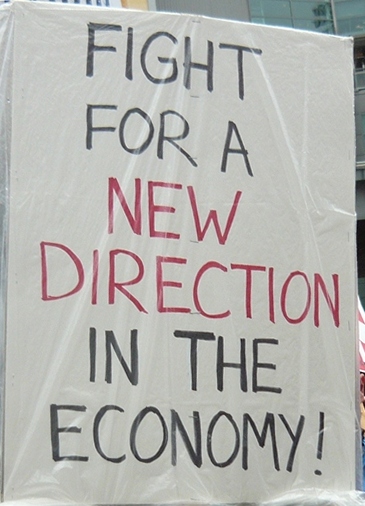  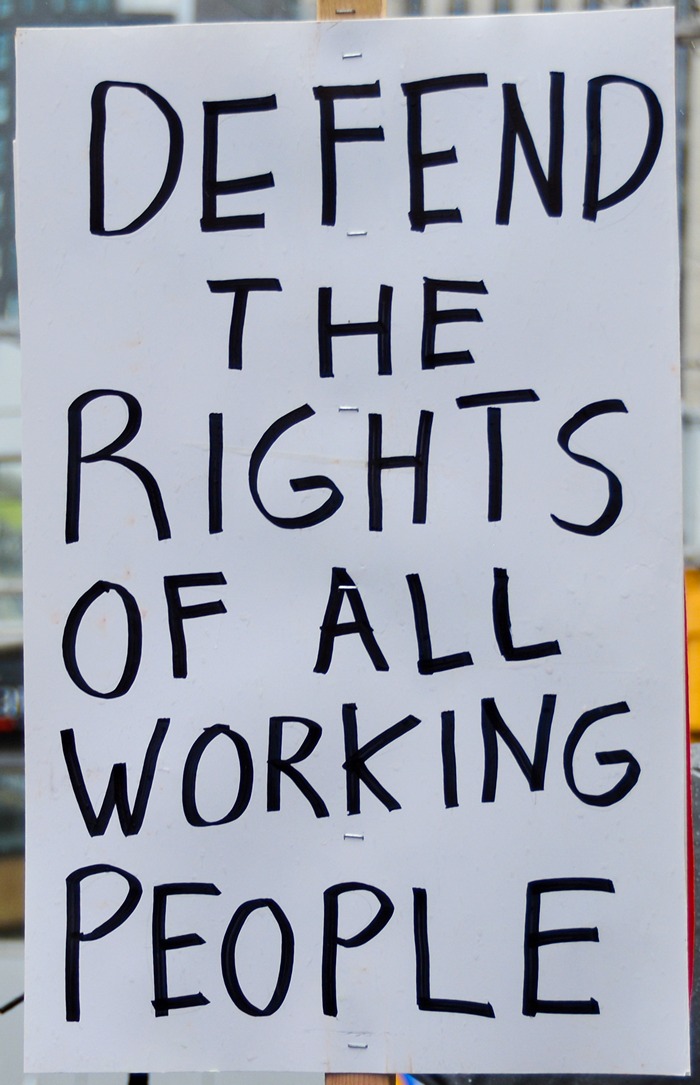
31st Constitutional Congress of the
Quebec Federation of Labour
The Difficult Situation Facing the FTQ
The 31st Constitutional Congress of the Quebec
Federation of Labour (FTQ) opens November 28 in Montreal and concludes
December 2. The delegates, who hail from all parts of Quebec, see the
five day convention as an opportunity to put forward an agenda of work
which deals with the nefarious consequences of the brutal anti-social
offensive. They come to the Convention with a rich experience of firm
opposition to the anti-social austerity agenda of the rich and
governments in their service in both Quebec and at the federal level.
This has also given rise to a deep concern over the direction of the
economy and future of society. This concern has deepened manifold as a
result of the recent U.S. election which brought Donald Trump to the
presidency with his promises to run the U.S. state like a business and
what this means for Canada, Quebec and the rest of the world.
 At present, the anti-social
offensive appears as the concentration
of power in the hands of the global oligopolies of the financial
oligarchy.[1] Their supranational
arrangements are designed to place at
their disposal all the social wealth workers produce and the natural
resources of the nation for use in their private empire-building.
Crushing the
organized resistance of workers and their unions is in the forefront of
the attack of the oligopolies on nation-building and society. The
financial oligarchy knows full well that an organized and conscious
working class is the greatest defender of the rights and well-being of
all and the general interests of nation-building and society. At present, the anti-social
offensive appears as the concentration
of power in the hands of the global oligopolies of the financial
oligarchy.[1] Their supranational
arrangements are designed to place at
their disposal all the social wealth workers produce and the natural
resources of the nation for use in their private empire-building.
Crushing the
organized resistance of workers and their unions is in the forefront of
the attack of the oligopolies on nation-building and society. The
financial oligarchy knows full well that an organized and conscious
working class is the greatest defender of the rights and well-being of
all and the general interests of nation-building and society.
When the oligopolies want something, they take over the
state institutions and get laws and regulations passed which are
intended to get them what they want. Only the struggle of the workers
for justice, human dignity and the rights of all stand between the
people and unbridled impoverishment and enslavement in the name of
prosperity, freedom, human rights and democracy. Such is the case with
the broad attack on the rights of municipal workers to negotiate their
working conditions, which are the very conditions for the delivery of
public services. By denying municipal workers their right to
participate in
making decisions concerning their working conditions and the economic
and social development of the cities and towns in which they work, the
global oligopolies are attempting to remove all obstacles to their
seizure of Quebec's municipal assets and their capacity to generate new
value. They want open season on the collective wealth of
municipalities and the social wealth workers produce.
The Quebec Liberal cabinet passed Bill 110 to
seize control of
negotiations in the municipal sector so as to serve the takeover of
public services by global oligopolies and their anti-social
supranational agenda imposed among other ways through free-trade
agreements under their control. A treaty such as the Comprehensive
Economic and
Trade Agreement (CETA) with the European Union considers public
services as assets and markets to exploit. The global oligopolies want
to sweep aside any government of laws, any national decision-making
that may serve the well-being of the people and society and recognize
the rights of workers. They demand freedom to trade on their terms
to satisfy their narrow private interests and the right to sue
governments that may restrict their exploitation of workers and the
nation's assets and natural resources.
The dictate of the global
oligopolies can also be seen in the
attempts of governments in their service to impose "free zones." The
oligopolies want free zones where they are exempt from state claims on
the added-value workers produce and where labour, commercial and
environmental laws and regulations do not exist or are flouted in the
name of "being competitive" and "attracting investment."
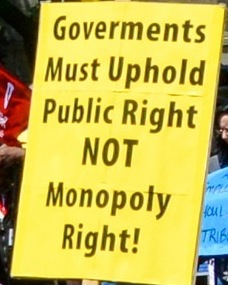 The Couillard Liberals plan
to impose free zones within their
Maritime strategy. Within these zones, the government promises the
oligopolies it will make no claim on their net income. It will provide
them with all privileges and exemptions from regulations if that is the
demand of the international investors. The government even promises to
lower the rate of unionization in Quebec and take stern measures
against workers' organized resistance so that the financial oligarchy
can have free rein to exploit workers and resources at whim outside any
government of labour laws. The Couillard government's Plan Nord is
itself a vast free zone to serve the power, privilege and
empire-building
of mining oligopolies for whom resources and rights are sacrificed. The Couillard Liberals plan
to impose free zones within their
Maritime strategy. Within these zones, the government promises the
oligopolies it will make no claim on their net income. It will provide
them with all privileges and exemptions from regulations if that is the
demand of the international investors. The government even promises to
lower the rate of unionization in Quebec and take stern measures
against workers' organized resistance so that the financial oligarchy
can have free rein to exploit workers and resources at whim outside any
government of labour laws. The Couillard government's Plan Nord is
itself a vast free zone to serve the power, privilege and
empire-building
of mining oligopolies for whom resources and rights are sacrificed.
The workers' movement puts on its agenda the need to
step up organized resistance in defence of its rights and the rights of
all at a time grave dangers exist. These dangers include the stepped up
criminalization of resistance struggles, dangers posed as a
result of theft and plunder of resources and careless exploitation of
the natural environment as well as increased danger of all out war.
The workers' movement is its own saviour and has the
ability to map
out a new direction for the economy that guarantees the rights of all
and their well-being, and affirms the general interests of the nation
and society. The worker's movement must cast off all doubts and
hesitation regarding its capacity to control the economic, political
and
social affairs of the nation and defend it from the marauding financial
oligarchy. Our future rests in our own firm hands.
A difficult situation faces the FTQ at this time
as its members are threatened in myriad ways if they refuse to
cooperate with the anti-social aims of the rulers. Only by standing
firmly in defence of just social aims and in defence of the rights of
all can the workers movement and the FTQ, as one of the main trade
union centres in Quebec, make headway under these difficult
circumstances. Workers' Forum
wishes the delegates to the FTQ Congress successful deliberations.
Note
1. The three salient
characteristics of oligopoly are
commonly described as: (1)
an industry dominated by a small number of large firms, (2) firms
sell either identical or differentiated products, and (3) the
industry has significant barriers to entry. (i.e. Coca
Cola/Pepsi Cola, the pharmaceutical industry, communications,
health insurance, high technology, etc.). Whether by
noncompetitive practices, government mandate or technological
savvy, these companies take advantage of their position to
increase their profitability.

Discussion on the Theme of the Congress
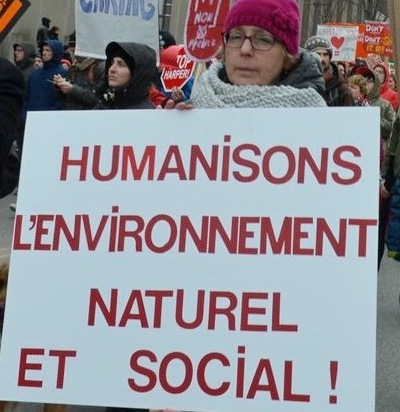 The FTQ delegates attending
the 31st Congress do so within a
situation in Quebec of increasing abuse and denial of workers' rights
including the right to negotiate collective agreements. Also, the
political atmosphere throughout North America with the election of
oligarch Donald Trump as U.S. President is very concerning for
working people. The reality as it presents itself needs serious
discussion in a calm but firm atmosphere of resistance to all attacks
on rights and the necessity for a new direction for the economy and
nation. The FTQ delegates attending
the 31st Congress do so within a
situation in Quebec of increasing abuse and denial of workers' rights
including the right to negotiate collective agreements. Also, the
political atmosphere throughout North America with the election of
oligarch Donald Trump as U.S. President is very concerning for
working people. The reality as it presents itself needs serious
discussion in a calm but firm atmosphere of resistance to all attacks
on rights and the necessity for a new direction for the economy and
nation.
Within the concrete conditions workers face, the theme
of the
Congress as presented of a fight against social inequality and for
transition to a green economy, especially from the point of view of a
transition in jobs this may bring about, is problematic. Such a theme
does not have a sharp edge aimed at defeating the assault on rights and
charting a new path forward for the economy.
Broad statements on social inequality and the green
economy only
make sense if the FTQ, similar to all defence organizations, has a bold
agenda in defence of all those who are under attack, and recognizes the
need to put the full weight of the organized workers' movement behind
particular struggles. These include all workers who are
waging battles for their rights, for their pensions and wages or
struggling against contracting out and privatization; workers in
opposition to companies reneging on agreements such as Rio Tinto; and,
those fighting government actions to deny workers their fundamental
right to negotiate collective agreements, such as Premier Couillard's
unjust
Bill 110 targeting municipal workers.
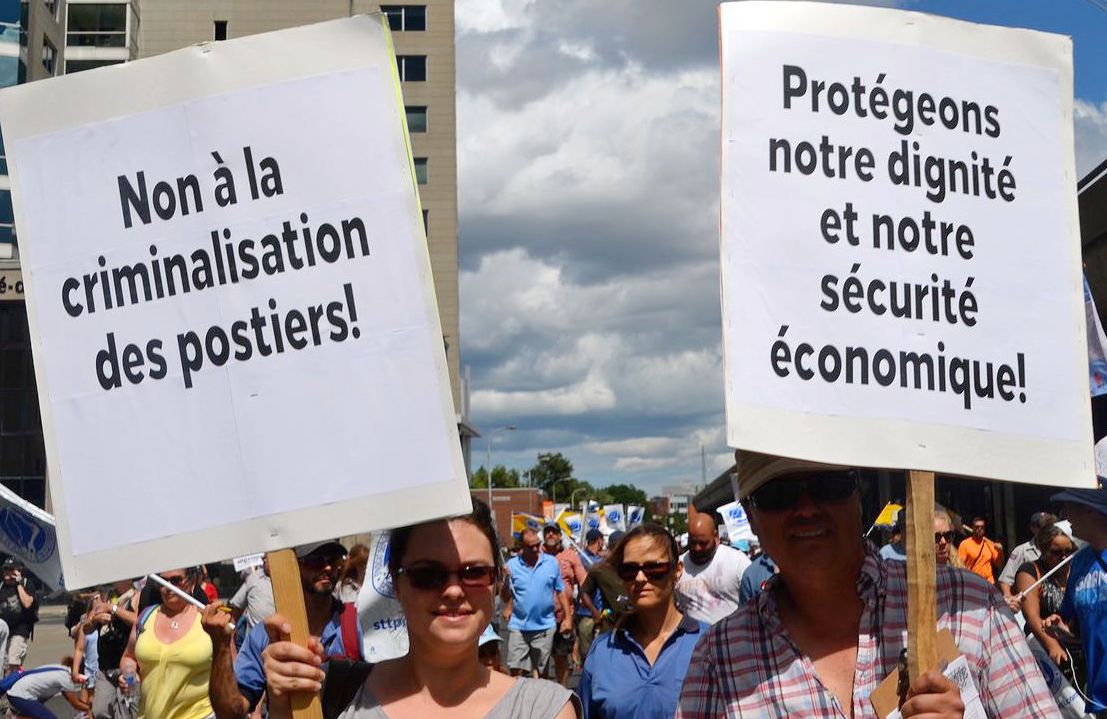 Postal workers have been
waging a protracted fight to stop the
dismantling and privatization of Canada Post and the phony
consultations of the Trudeau government, which began from an
anti-worker premise that the work-time of postal workers is a cost to
the economy and does not create value. The struggles include the youth,
where the
most vulnerable youth have just been hit hard by the passage of
Bill 70
attacking people on welfare instead of changing the social conditions
that give rise to inequality, poverty and hopelessness. The struggles
include women, indigenous nations, students, seniors and all those
whose dignity and rights are under attack. Postal workers have been
waging a protracted fight to stop the
dismantling and privatization of Canada Post and the phony
consultations of the Trudeau government, which began from an
anti-worker premise that the work-time of postal workers is a cost to
the economy and does not create value. The struggles include the youth,
where the
most vulnerable youth have just been hit hard by the passage of
Bill 70
attacking people on welfare instead of changing the social conditions
that give rise to inequality, poverty and hopelessness. The struggles
include women, indigenous nations, students, seniors and all those
whose dignity and rights are under attack.
All these particular struggles need a particular agenda
of
resistance, which must include the full weight of the organized
workers' movement. A general statement on social inequality and the
green economy means little when it comes down to the actual battles
people are waging in defence of their rights. The same is true when
speaking of a
transition to the green economy in terms of jobs. With this transition,
similar to all aspects of life in Quebec, the first issue to be settled
surrounds who controls the transition and whom will the transition
serve. Are the working people themselves in control? The truth of the
matter is that the working people control nothing in the socialized
economy and society other than some private matters and their own
independent organizations and institutions.
 No one can deny that the
basic economy today is under the control
of the financial oligarchy. Any change is also under its control. With
this understanding of the reality, how can the working people control
any transition to a green economy or struggle against inequality and
keep affairs out of the hands of those forces presently in control
of the economy and society who are plotting to profit from any change.
Only the social forces that are defending their rights though actions
with analysis independently from the dominant privileged class can
establish a meaningful agenda to deal with these problems, can give the
movement for change a positive aim, and decide who the changes are
to serve and under whose control the outcome will be. No one can deny that the
basic economy today is under the control
of the financial oligarchy. Any change is also under its control. With
this understanding of the reality, how can the working people control
any transition to a green economy or struggle against inequality and
keep affairs out of the hands of those forces presently in control
of the economy and society who are plotting to profit from any change.
Only the social forces that are defending their rights though actions
with analysis independently from the dominant privileged class can
establish a meaningful agenda to deal with these problems, can give the
movement for change a positive aim, and decide who the changes are
to serve and under whose control the outcome will be.
General statements on important social and political
issues first
have to concretize the reality of all the particular struggles and who
is in control of the struggle to put right what is wrong in the economy
and society. General statements are useless unless first the full
weight of the workers' movement is brought to bear on all the
particular
struggles people are waging in defence of their rights. Through these
battles in defence of rights, the people can put those of their peers
in
control who are genuine and have proved themselves in battle, those who
seek only outcomes that favour the people and not the financial
oligarchy.
Election of Oligarch Donald Trump
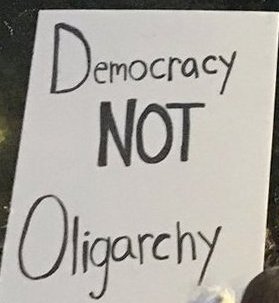 The issue of the
election of oligarch Donald Trump as President of the United States is
an issue of concern for the delegates and workers generally and indeed
the whole of humanity. His election strengthens the rule of the
oligopolies through the use of unrestrained police powers, which
function
through repression and criminalization, negating the very existence of
people fighting for their rights. Those who resist the anti-social
offensive and fight for their rights and the rights of all are
presented as "troublemakers," "professional demonstrators" and other
derogatory categories of things so as to justify the use of police
powers to crush them.
Trump's election is yet another stone thrown at the working people and
society. The constant provocations and threats from the highest
authority in the United States and the disinformation in the media
raise the necessity to discuss these matters in a calm and rational
climate with the aim to find solutions through actions with analysis
that favour
working people. The issue of the
election of oligarch Donald Trump as President of the United States is
an issue of concern for the delegates and workers generally and indeed
the whole of humanity. His election strengthens the rule of the
oligopolies through the use of unrestrained police powers, which
function
through repression and criminalization, negating the very existence of
people fighting for their rights. Those who resist the anti-social
offensive and fight for their rights and the rights of all are
presented as "troublemakers," "professional demonstrators" and other
derogatory categories of things so as to justify the use of police
powers to crush them.
Trump's election is yet another stone thrown at the working people and
society. The constant provocations and threats from the highest
authority in the United States and the disinformation in the media
raise the necessity to discuss these matters in a calm and rational
climate with the aim to find solutions through actions with analysis
that favour
working people.

PREVIOUS
ISSUES | HOME
Website: www.cpcml.ca
Email: office@cpcml.ca
|

